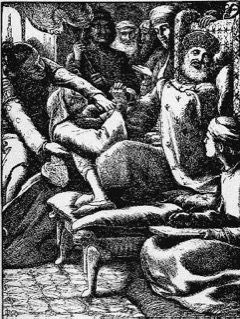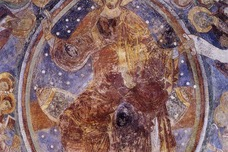Sunday Reflection with Canon Robin Gibbons - 16 October 2022

John Everett Milais. Parable of the Unjust Judge
Twenty-ninth Sunday in Ordinary Time
I have puzzled long and hard about today's gospel, true, there is the sense that prayer, particularly in the case Jesus cites of the widow and the judge, is about determined persistence, the words we find Jesus uses here is about urging us to pray 'without becoming weary'! I can understand that and also the attitude of persistent faith it represents, but before we reflect what that might mean there is a problem-here it is: 'The Lord said, "Pay attention to what the dishonest judge says. Will not God then secure the rights of his chosen ones who call out to him day and night? Will he be slow to answer them? I tell you, he will see to it that justice is done for them speedily. But when the Son of Man comes, will he find faith on earth?"'(Lk 18:6-8) Fine words, but do they ring true? We can be forgiven for being a bit cynical, think of your own needs (or those of others) and how you have prayed for things down the years, how many of us have had justice done speedily? Hand on my heart, I have to say almost never!
Now a wiser person than myself would, like many religious people do, take me aside and suggest that I had the big 'I' as a barrier in my prayer, they might put it this way by telling me that what I want is not always the way of the Most High. Of course I am aware of that, most of us realise our mixed motives in desire, need and want, but it seems unfair to suggest that the Holy One will hear and answer the cry of need , of despair in an unjust situation and done in a speedy manner! It does not often seem like it! I know, and you may well tell me that God time is not our time,yet there might be a roadmap out of this, Paul in our second reading reminds us of this ,' you have known [the] sacred scriptures, which are capable of giving you wisdom for salvation through faith in Christ Jesus'(2Tim 3:15) That is our life line, delve into the Scriptures not for proof text but for living inspiration.
So back to the supposed unanswered prayers. If we think hard we will soon discover events that were not speedily answered at all.
I also think of the passion of Christ and his own desire that the cup be taken from him, and later on before death, that stark nihilistic cry on the cross, 'My God, my God, why have you forsaken me?'(Mt 27:46) It comes from Psalm 22 and it is there I delve to see if any help can be found to this conundrum of religious faith. It is a psalm of intense suffering, of somebody who has really gone through the mill in both the physical life, but also in the spiritual pain and darkness of apparent abandonment by God.And yet in the darkness there is also a presence, the real clue to the gospel and that judge and widow and it is the silent presence of 'God who-is -love'.
How can it help? Does it shed light on the insistence by Jesus of each one of us being fiercely persistant , of not ever giving up hope? There are glimpses of others who have known this and do not give us saccharine and pietistic answers, but tell it as it is, Teresa of Calcutta and Therese of Lisieux knew abandonment by God, psalm 22 was very much theirs, and so it has been for so many on the exciting journey of faith. Mother Teresa gives us what at first hearing might seem an utterly shocking thought: "I feel just that terrible pain of loss, of God not wanting me, of God not being God, of God not really existing."Desolation and absence, no quick and speedy solicitude from the Divine One here! But let us stop and think, is my faith, your religious experience simply about how you or I feel, or the need for a constant assurance of perpetual presence? That is not life. Think of your relationships, and dwell on that word 'think', can we ever miss what we have never known? As a child the valid absence of our parent from us, for one reason or another does not mean that the parent does not love us nor care, there is trust , and there is also something else, the space to appreciate and grow, to listen and learn to the other. We persist in our relationships, we hang on in there no matter what, we start to learn about and also from each other and above all we don't give up hope. I think there lies the meaning of today's Gospel, God is not a conjuror, nor the giver of panacea, the psalmist in Ps 22 puts it like this: 'From birth I was cast on you; from my mother's womb you have been my God.
Do not be far from me, for trouble is near and there is no one to help'.(Ps 22:10,11) That is a statement of utter trust and it is the place we must reach!
But prayer is also about a relationship that is two way, it is also about learning to understand just where God is in life, it is about the work, effort and discipline of our faith in the everyday, joy and pain, laughter and tears. John of the Cross advises those of us who wish to enter into a deeper relationship with God in this way: "Desire to possess nothing, in order to arrive at being everything." It is much the same as those words, 'Repent and believe the Gospel' or to 'take up our cross' and follow Christ. As Christ learnt what sin and death meant, and how it is defeated and transformed, so must we, joining in with Him means we also become like Him and rise with Him. We walk by faith, with hope and love, and on that walk our hearts begin to burn within us, and we realise that after all, we have never been abandoned by God.
Lectio
Psalm 22 ( New International Version)
For the director of music. To the tune of "The Doe of the Morning." A psalm of David.
1 My God, my God, why have you forsaken me? Why are you so far from saving me, so far from my cries of anguish?
2 My God, I cry out by day, but you do not answer, by night, but I find no rest.
3 Yet you are enthroned as the Holy One; you are the one Israel praises.
4 In you our ancestors put their trust; they trusted and you delivered them.
5 To you they cried out and were saved; in you they trusted and were not put to shame.
6 But I am a worm and not a man, scorned by everyone, despised by the people.
7 All who see me mock me; they hurl insults, shaking their heads.
8 "He trusts in the LORD," they say, "let the LORD rescue him. Let him deliver him, since he delights in him."
9 Yet you brought me out of the womb; you made me trust in you, even at my mother's breast.
10 From birth I was cast on you; from my mother's womb you have been my God.
11 Do not be far from me, for trouble is near and there is no one to help.
12 Many bulls surround me; strong bulls of Bashan encircle me.
13 Roaring lions that tear their prey open their mouths wide against me.
14 I am poured out like water, and all my bones are out of joint. My heart has turned to wax; it has melted within me.
15 My mouth is dried up like a potsherd, and my tongue sticks to the roof of my mouth; you lay me in the dust of death.
16 Dogs surround me, a pack of villains encircles me; they pierce my hands and my feet.
17 All my bones are on display; people stare and gloat over me.
18 They divide my clothes among them and cast lots for my garment.
19 But you, LORD, do not be far from me. You are my strength; come quickly to help me.
20 Deliver me from the sword, my precious life from the power of the dogs.
21 Rescue me from the mouth of the lions; save me from the horns of the wild oxen.
22 I will declare your name to my people; in the assembly I will praise you.
23 You who fear the LORD, praise him! All you descendants of Jacob, honor him! Revere him, all you descendants of Israel!
24 For he has not despised or scorned the suffering of the afflicted one; he has not hidden his face from him but has listened to his cry for help.
25 From you comes the theme of my praise in the great assembly; before those who fear you I will fulfill my vows.
26 The poor will eat and be satisfied; those who seek the LORD will praise him- may your hearts live forever!
27 All the ends of the earth will remember and turn to the LORD, and all the families of the nations will bow down before him,
28 for dominion belongs to the LORDand he rules over the nations.
29 All the rich of the earth will feast and worship; all who go down to the dust will kneel before him- those who cannot keep themselves alive.
30 Posterity will serve him; future generations will be told about the Lord.
31 They will proclaim his righteousness, declaring to a people yet unborn: He has done it!
St John of the Cross
"Since the conduct of these beginners in the way of God is lowly and not too distant from love of pleasure and of self, as we explained, God desires to withdraw them from this base manner of loving and lead them on to a higher degree of divine love. And he desires to liberate them from the lowly exercise of the senses and of discursive meditation, by which they go in search of him so inadequately and with so many difficulties, and lead them into the exercise of spirit, in which they become capable of a communion with God that is more abundant and more free of imperfections" (Dark Night of the Soul, Book I, Chapter 8).
Father Alexander Schmemann
The Divine Child
Christ said "become like children" (Mt 18:3). What does this mean? What are adults missing, or better, what has been choked, drowned or deafened by a thick layer of adulthood? Above all, is it not that capacity, so characteristic of children, to wonder, to rejoice and, most importantly, to be whole both in joy and sorrow? Adulthood chokes as well the ability to trust, to let go and give one's self completely to love and to believe with all one's being. And finally, children take seriously what adults are no longer capable of accepting: dreams, that which breaks through our everyday experience and our cynical mistrust, that deep mystery of the world and everything within it revealed to saints, children, and poets.
Thus, only when we break through to the child living hidden within us, can we inherit as our own the joyful mystery of God coming to us as a child. The child has neither authority nor power, yet the very absence of authority reveals him to be a king; his defenselessness and vulnerability are precisely the source of his profound power. The child in that distant Bethlehem cave has no desire that we fear him; He enters our hearts not by frightening us, by proving his power and authority, but by love alone.


















